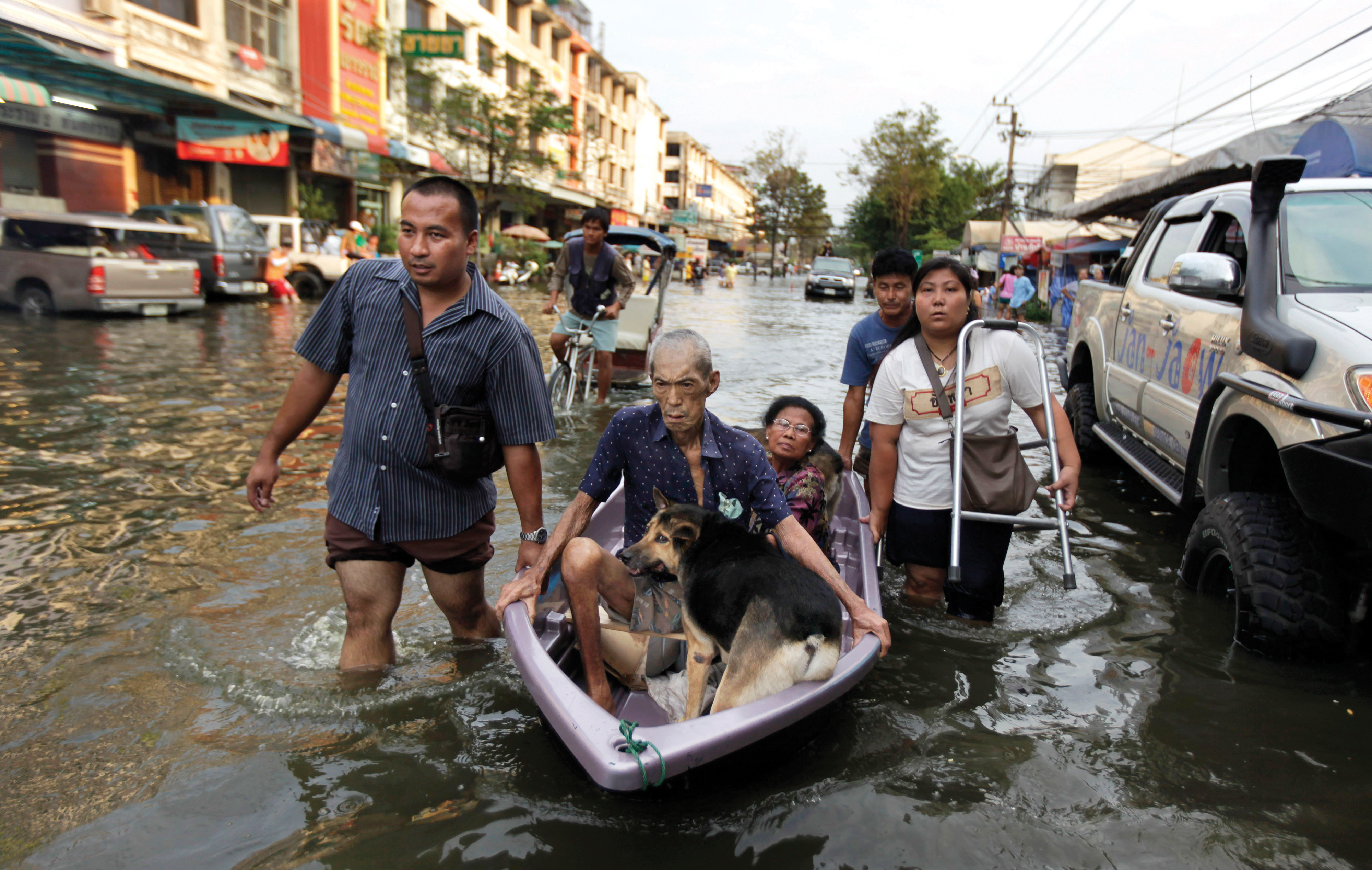UC Education Abroad Program working to keep students in Thailand safe from heavy floods

An elderly Thai couple and their pets ride a boat as they are evacuated from a flooded neighborhood in Bangkok, Thailand, Sunday, Nov. 13, 2011. Bangkok authorities are telling more residents to leave as floodwaters threaten southwestern neighborhoods in the Thai capital. (AP Photo/Altaf Qadri)
By Daily Bruin Staff
Nov. 15, 2011 1:44 a.m.
Kaitlin Barnea has witnessed trash-ridden waters and bare supermarket shelves in her term studying abroad in Bangkok, Thailand.
The country is currently experiencing its heaviest floods in about 50 years. The floods, which began in July, have resulted in more than 500 deaths, though no injuries have been reported among UC students.
In late October the floodwater reached the region in Bangkok where Barnea and her UC Education Abroad Program classmates were living. Classes were canceled on Oct. 11 and are set to resume at the Bangkok location on Nov. 21.
The program also temporarily evacuated students from Thammasat University, where UC students were studying, on Oct. 26.
Barnea, a third-year anthropology student, and her fellow UCEAP students have been given until Saturday to decide whether to return to California or continue their studies in Thailand.
If they choose to stay, they will have the option of staying in nearby hotels until the water recedes from their university apartments.
Evacuation accommodations have been covered by the UCEAP travel insurance, as will evacuation housing through Saturday and all return flights, according to a statement from the UCEAP.
Students who decide to finish the program will take the remaining time in the program to complete their credits.
“(We’ll) have to take 70 hours of lecture for the upcoming weeks in order to make up for lost time,” Barnea said.
Though a domestic airport was flooded, Bangkok’s international airport, which also hosts domestic flights, remains dry and has allowed many of the students to use the month of canceled classes to travel.
Brian Castor, a fourth-year history student studying in Thailand, said he took the time to visit a northern province. He said many of the other students in the program have also gone traveling and that he has not seen most of his fellow classmates for more than a month.
Castor will be returning to Bangkok on Monday. He said his friends who have returned from their trips told him the lobby in their Bangkok housing is knee-deep in dirty water, and green mold has begun to grow on the lobby walls.
Barnea, who has been studying in Thailand since late July, said floodwaters in Bangkok have become contaminated with trash, human waste, reptiles and the carcasses of stray animals.
Roger Detels, professor of epidemiology who specializes in Southeast Asia, said flooding generally results in the backing up of sewer systems, which results in people wading through water full of viral and bacterial contaminants.
The flooding has caused students in Thailand more than just housing problems, from interruptions in transportation to water contamination. The floods also caused a band of crocodiles to escape from a local crocodile farm.
Barnea has seen locals wading through the floodwaters to get to their homes and even fishing in it to feed their families.
However, Kantathi Suphamongkhon, former minister of foreign affairs for Thailand and a visiting law professor, said that despite the health risks associated with floods, contamination in Thailand has not caused any major outbreaks of disease.
The major causes of civilian deaths have been drowning and electrocution, Suphamongkhon said.
The severity and length of the floods themselves have been the subject of conflicting reports. Suphamongkhon said an ineffective bureaucratic structure has contributed to contradictory statements from federal and local government officials.
A lack of coordination between agencies, duplication and slow response times have been additional complications, Suphamongkhon said.
But he added the floodwaters are beginning to recede in Bangkok, and the rainy season is drawing to a close.
Castor and Barnea said they are still undecided about whether they want to stay in Thailand or return to California.
Barnea said leaving Thailand is a difficult decision because she has been studying there for four months. Castor said he may not see many of his European or Thai friends again if he chooses to leave.
Either way, they said they are anxious for a resolution.
“We have been forced to put our lives on hold for five weeks,” Barnea said.

